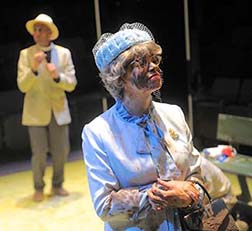
Lucy
Komisar
|
“Confusions” Written and directed by Alan Ayckbourn. This 1974 Alan Ayckbourn play, seen for the first time in the U.S., is a master class in how to use theatrical devices. In five one-act plays with the same superb ensemble cast, it uses absurd farce, irony and slapstick to show how people miscommunicate as their needs and desires collide.
My favorite is “Between Mouthfuls,” in which the device is that the only dialogue we hear from two couples at nearby restaurant tables are the words the waiter (Stephen Billington) hears when he approaches their tables. As he moves away table, that couple’s lips move but we hear nothing. But little by little, he grasps the story that involves them all. The couples are a company owner, Mr. Pearce (the excellent Russell Dixon) and his wife (Elizabeth Boag) and Martin (Richard Stacey), who works for him, and his wife, Polly (Charlotte Harwood). Turns out Pearce and Polly have each just returned from three weeks in Italy. You can guess the rest without the furious Mrs. Pearce (terrifically played by Boag) storming that she will kill the lady she assumes he was trysting with. In another, “Mother Figure,” Lucy (Boag), a housewife and mother of three who never gets out of her housecoat let alone the house, is so overwhelmed by her mothering role, that she treats visiting neighbors as if they were children. Boag is hysterical in the role, in both meanings of the word. To the point of insisting that Terry (Billington) drink a glass of milk and when Rosemary (Harwood) gets teary, Lucy declares, “Look who’s watching you.” She picks up a doll, “Mr. Poddle’s watching you.” But the hidden sadness is her own.
Another clever bit is that in most cases, a character from one play appears in the next. So that in “Drinking Companion,” Lucy’s errant husband, the increasingly pathetic Harry (Stacey), a traveling salesman spending the night out of town, attempts to seduce a visiting perfume saleswoman (Harwood) and then also her co-worker (Boag). Their waiter will appear in “Between Mouthfuls.” And Mrs. Pierce will show up again in “Gosforth’s Fête,” a slapstick that involves the organizer of a community fair fiddling with a loudspeaker to make it work, then holding the live mike while Milly (Harwood) informs him that she is pregnant. Her boyfriend, the scoutmaster, (a very distraught and funny Billington) arrives furious. The vicar (Stacey) informs him that everyone knew it but him.
\Meanwhile, the scouts cavort in the mud where they ensnare Mrs. Pearce, who is the local councillor there to give the welcoming speech. The combination of thunderous rain and human stupidity spells comic disaster. The characters in “A Talk in the Park” are new to us, but not to the theme of the failure of communication. Here on four park benches, in a variation on musical chairs, the odd character with a bench sits down on an occupied one. At first Arthur (Dixon), an elderly man, sits down next to a young woman (Boag) and proceeds to tell her about his collections: cigarette cards and also people. She couldn’t care less and moves over to the next bench, where she regales Charles (Stacey), who is reading a report about a note from Tom, who beat her and wants to come back. He proceeds to shift over to the bench on which Doreen (Harwood) is hunched over, and tells his woes: his wife has died, his children moved to Canada, etc. So she moves to next to Ernest (Billington) to confide how she left her husband because he didn’t want a dog. He will skip across to Arthur. All are ready to burden people with their life complaints and utterly unwilling to hear the same from others. Ayckbourn is superb at using these small moments of human interaction to comment on the human condition. |
| museums | NYTW mail | recordings | coupons | publications | classified |



